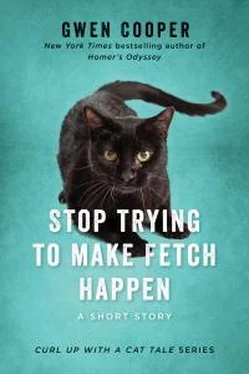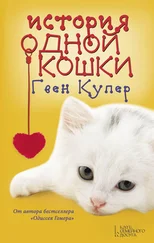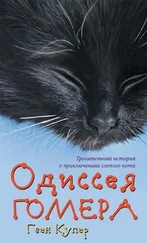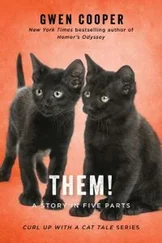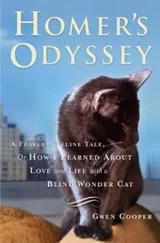Clayton, without question, fares much better.
Eventually, Clayton will flip onto his back and nestle in the crook of my arm, his nose wedged into my armpit (Clayton being something of an armpit fetishist) and his chin resting on my breast, which he kneads ecstatically with his front paws. If there’s one thing I’ve learned from watching My Cat From Hell , it’s that cats emphatically do not like being cradled on their backs like babies. But Clayton is the exception to this rule. Not only does he like it, he insists on it. At least once a day, while I’m working at the computer, he’ll crawl into my lap, flop onto his back, and snuggle himself in the bend of my elbow. I’ve learned to type with one hand so that the other is free to balance Clayton’s supine body against my chest—as if my arm were a baby sling—as he drifts into sleep.
“You did this to him,” Laurence says whenever he comes upon us in this Madonna-and-child pose. (Laurence likes to think that he’s much more measured and “reasonable” in his affections for the cats than I am, but when he thinks he’s out of earshot upstairs, I hear him with them. How’s my little man? he’ll say. Or, You’re a sweet kitty . . . yes, you are! Yes, you are! ) “You made him this way.”
“ Un true!” I reply. “Clayton’s just naturally a very attention-seeking cat, and I’m just naturally the kind of person who pays attention to attention-seeking cats.”
There’s some truth to the idea that Clayton is far more people-oriented than even the friendliest feline. It’s one thing for a cat to leap immediately into the lap of every visiting guest, without so much as first giving a preliminary sniff or receiving a cursory pat on the head. But how many cats fling themselves—purring and rapturous—into the arms of a veterinarian who’s just given them a shot? You stuck a needle in me! I imagine Clayton saying. That means you’re paying attention to me! You’re my new favorite human!!!
Whatever natural, attention-seeking inclinations Clayton might have started out with have certainly been amplified by the sheer volume of time my cats and I now spend together. I adopted my first generation of cats—Scarlett, Vashti, and Homer—twenty years ago. Back then I was young and single, working long hours in an office all day and going out with friends or on dates at night.
But I adopted Clayton and his littermate, Fanny, in 2012. By then, I was already a full-time writer working from home, as was (and is) my husband. I used to be out of the house ten to fifteen hours on a typical weekday. Nowadays, Laurence and I will make a point of going somewhere, even if only out to lunch or to run errands, at least once every day. Some days we play hooky in Manhattan, taking in a movie or going to a museum for the bulk of the afternoon. We’ll go out a couple of nights a week to the theater, or to meet friends for dinner. Still, it’s not at all unusual for us to be home and with our cats for a good twenty-two hours in any given day. When I meet people at functions and they ask me what I do, I’m as apt to quip, I’m a stay-at-home cat mom as I am to go with the more serious-sounding I’m a writer. Both feel like equally accurate descriptions of my life.
Clayton and Fanny, in other words, are used to having near-constant access to their humans—and to human attention. Clayton spends his entire day in close proximity to me. If I go upstairs to talk to Laurence in his office—even if Clayton is in a deep slumber, and I’m only up there for a couple of minutes—Clayton will follow, eyes half-closed and dazed with sleep. If I head to the bedroom for a brief afternoon siesta, Fanny inevitably crawls out to join me from whatever hiding/sleeping spot she’s designated for the day—and a room that contains both Fanny and me is a room that Clayton absolutely must be in. Any foray into our first-floor kitchen—even a quick one to get a glass of water—automatically becomes a group excursion.
If I run out to the corner bodega, a mere half-block away, to get a can of soda, Clayton and Fanny race to greet me at the door upon my return as if I were coming home from the wars after a years-long absence. I can’t even describe how overwrought they are when Laurence and I get back from an overnight vacation, or a trip to do a book reading at an out-of-state animal shelter. Clayton and Fanny cling to us like two little black burrs—refusing even to let us go to the bathroom or take a shower unattended—and it takes days for things to return to normal. We thought you’d be gone forever! they seem to be saying. We thought you might never come home!
So we’ve become quite the codependent little foursome, Fanny, Clayton, my husband, and I. I often think that if cats could talk to each other, and if Clayton were to hear tales from other cats about humans who leave their homes for work every single day , and stay away for up to ten hours at a time, he would react with the same mingling of pity and horror I used to feel as a small child in Miami when my grandmother would tell stories about Life In The Olden Days—before there was air conditioning, television, or Cheez Doodles. “But what did you do ?” I’d demand, fighting back tears at the thought of my beloved grandmother enduring such hardships. “How did you live ?”
This is all by way of saying that when Clayton first taught himself to play fetch, and then decided that he really liked playing fetch—and then further decided that he wanted me to play fetch with him all the time —the stage had already been set for casual interest to develop into full-blown obsession.
* * *
Like so many great innovations, Clayton’s initial discovery of fetch was a happy accident. He’d always been fond of throwing games, particularly when they involved the crinkle balls and miniature plastic springs that were, not so very long ago, his favorite toys. I’d find one lying about, toss it a few feet away, and Clayton would run after it, batting it around for a while before finally losing interest and looking for something else to do.
That was more or less what I expected to happen one morning a few months ago when I spotted, lying next to my desk chair, one of the two little toy mice with rainbow tail feathers that I’d spontaneously bought for Clayton and Fanny the day before. When Clayton saw me lift it from the floor, his ears immediately pricked up and he sat at attention.
“You want this?” I said. “You want this, little boy?”
My tiny office nook sits off of our living room, and it was in that direction that I threw the mouse, watching as Clayton chased after it. When he caught up with it, he picked the mouse up in his mouth and shook it vigorously a few times, an instinctive “predator” reaction as much as a delighted response to the rattling sound the toy mouse made.
Something about Clayton sitting there on his haunches with that little gray-and-white mouse between his teeth—its merrily colored tail feathers curving upward toward his ear, as if he were an old-timey gentleman wearing a feathered cap—struck me as particularly adorable. “What a good boy you are!” I cried. “You’re a good, good boy, Clayton!”
My delight with him in that moment was obvious, and he responded to it by running back toward me, the mouse still clutched in his mouth only because, in his excitement to reach me, he’d forgotten it was there. There’s very little in this life that I find more endearing than Clayton’s hippity-hoppity three-legged run, his gait resembling a cross between a bunny hop and a drunken sailor trying to find his shore footing. And so, when he dropped the mouse and lifted his head toward my hand for a petting, I picked it up and threw it again.
Читать дальше
